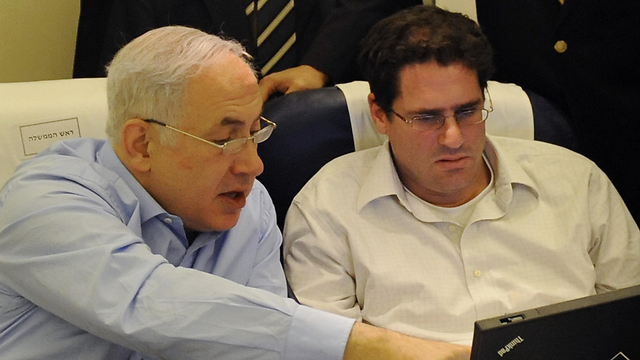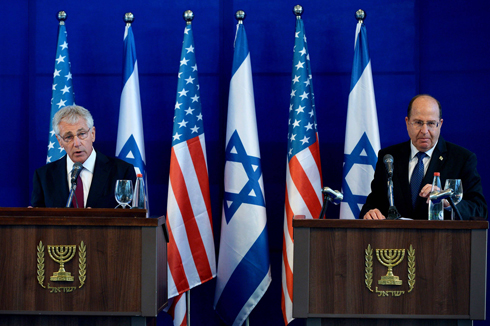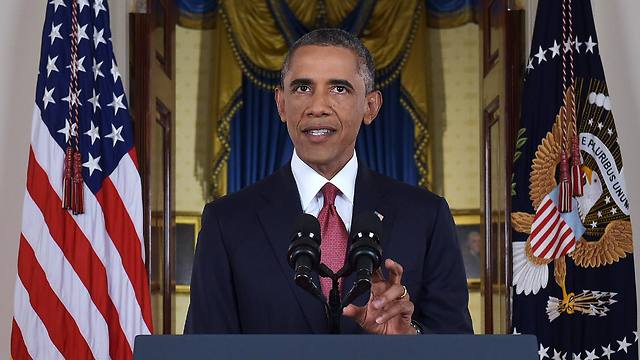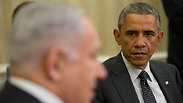
Whatever it does next, the US will be taking Israel on
Analysis: While military understandings remain in tact despite tensions between Obama and Netanyahu governments, the political side remains fair game in American eyes.
When senior US administration officials say to you, "I won't be in town when you get here," they're actually saying, "It doesn't suit me to meet with you now." And sometimes, the response is a little more subtle: "I won't be in town, but let's coordinate your visit at a later date." In the case of Israeli Defense Minister Moshe (Bogie) Ya'alon, Washington experienced a mass exodus; all of a sudden, no one was home.
When Ya'alon departed, he was already aware that Washington wasn't waiting for him. All efforts to arrange meetings for him in keeping with diplomatic protocol – via the military attaché and the Israeli Embassy – were doomed to failure from the outset.
Not only is our ambassador in Washington, Ron Dermer, not the most popular figure at the White House, but Congress is in recess now, of all times, ahead of the elections.
When tensions between the White House and the government of Israel stem from political-ideological disputes, maintaining a semblance of business-as-usual is still possible. But when things spill over into the personal domain, the style and the insults become personal too.
Ya'alon wasn't able to pick up on this in his meetings with US Defense Secretary Chuck Hagel and America's ambassador to the UN, Samantha Power. He learned instead of the intensity of the affront and resentment on the part of the Americans in the informal talks he held in Washington, particularly with senior media representatives. There, he was told exactly what Washington thinks about Jerusalem.
The possibility that the United States will not veto a UN resolution calling for the establishment of a Palestinian state in keeping with the 1967 borders is not a theoretical threat. Jerusalem has internalized the fact that this is a realistic option and is preparing for it.
The battle on the Hill
The White House has tired by now of hearing about anti-President Obama briefings at Prime Minister Benjamin Netanyahu's bureau in Jerusalem and the Israeli Embassy in Washington, about the badmouthing of Obama, and about Israel efforts to undermine US administration policy.
Official and non-official American guests – members of Congress, AIPAC officials and journalists – come to Israel, hear lectures from Israelis about their problematic president, and then return home to spill the beans.
Recent weeks have seen a further deterioration. From both Dermer's and Netanyahu's circles, according to the Americans, they are hearing statements to the tune of: "As from this Tuesday, Congress will be fully in the hands of the Republicans, and then we'll deal with issues such as the political initiative and the negotiations with Iran from the Hill."
As Washington sees it, the hostility towards President Obama in the Prime Minister's Office is firmly fixed in place. It's a mutual hostility. When someone in the Prime Minister's Office describes Obama as a novice, cowardly and indecisive, the White House hears of it right away, and barbs are fired in return.
Today, Netanyahu associates believe that the expression, "chickenshit," quoted by journalist Jeffrey Goldberg, was a case of "premature ejaculation," and that's why the White House was quick to distance itself from it. The Americans had planned to launch an attack on Netanyahu only after the mid-term elections this Tuesday.
Israel is refusing to be banished to the corner. How, officials here are asking, can the secretary of state be trying to bribe Palestinian Authority President Mahmoud Abbas with far-reaching political commitments in return for the delaying of his appeal to the UN Security Council until after the elections to Congress? Can't, they're asking here, a superpower like the United States simply instruct Abbas to postpone such a move?
The defense minister, with whom the State Department has a separate score to settle for what it defines as "the sabotaging of Kerry's peace initiative," paid a price on his visit to Washington for his close ties with Netanyahu too. Ya'alon can take comfort in the fact that he's not the first Israeli defense minister to undergo a hazing in Washington.
In 1981, then-newly appointed U.S. defense secretary Caspar Weinberger taught Israel's defense minister at the time, Ariel Sharon, a lesson he'd never forget. Weinberger, who wasn't enamored with Israeli policy at the time, was forced, on instructions from then-president Ronald Reagan, to sign a memorandum of understanding with Israel.
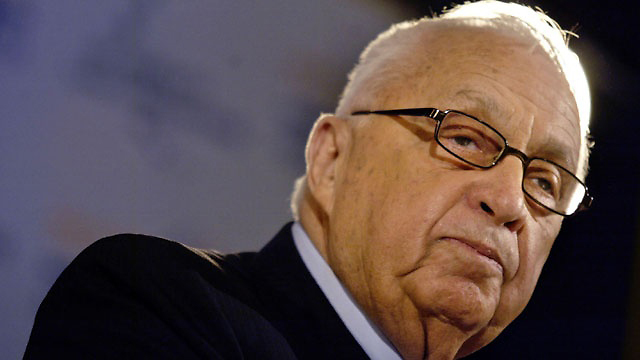
Weinberger arranged, however, for the signing ceremony to take place not at the Pentagon but in the lobby of the National Geographic Society building. Sharon got the message, learned a lesson; and as prime minister, all the doors of the US administration remained open to him. We're unlikely to witness the repeat of a happy ending like that one with the personalities currently in the ring.
Sharon was still living in an era in which even during the most bitter crises between the two sides, there was always someone who'd travel secretly to Jerusalem or Washington to clean out the blocked sewage pipes. There's no one like that around today – not on the Israeli side, and not on the American side either. And with every blockage, the sewage rises a little more.
The Clinton plan in an Obama sauce
Ya'alon believed his differences with Secretary of State Kerry had been resolved. In the time since the crisis between the two erupted last summer, they have spoken on numerous occasions about the most sensitive of issues, including during the fighting in Gaza. He was under the impression that when he said he was sorry if anyone had been offended by his statements, Washington had seen it as a public apology. He was wrong. Washington wasn't appeased.
No wonder Ya'alon feels that the US administration has marked him as responsible for undermining progress in the talks with the Palestinians. The defense minister and his bureau are convinced that immediately upon presentation of Kerry's initiative, the State Department launched a media campaign against Ya'alon to depict him as an enemy of any peace settlement. Even paranoid people are right sometimes.
But Ya'alon's mission in Washington was one pertaining to money, and he insisted therefore on traveling to the United States at this inconvenient time. After the 2015 budget was settled, the defense minister had to get to a meeting with his counterpart, Hagel, to sum up the work conducted over the past year by joint taskforces with respect to the military equipment Israel will be purchasing in the United States in the framework of the defense aid package from Washington.
There were no surprises waiting for Ya'alon in this regard. The US administration upheld every single one of its security commitments to Israel. Moreover, the defense minister's entourage got the sense that the deeper the political dispute between the sides, the stronger America's commitment to its security ties with Israel.
Not a single aid program was canceled, aside from those that Israel itself asked to alter, like the acquisition of Namer armored personnel carriers instead of an investment in V-22 Osprey aircraft.
The US also allowed Israel to make purchases based on the aid packages for the coming years – a loan of sorts to help with the shopping. Thus, Israel can acquire six more F-35 fighter jets to make up a full squadron, with the first aircraft to be delivered in late 2016, as well as an additional 25-aircraft squadron beginning in 2019.
US teams are in Israel to study the lessons learned during Operation Protection; and Hagel and his staff were very upfront when it came to the Iranian issue too.
The agreement based on which the United States provides Israel with foreign aid to the tune of $3.1 billion a year comes to an end in 2017. Obama has undertaken verbally to extend this agreement for another decade. He has yet to sign a thing, and Israel, too, is in no hurry to ask him to do so – further evidence of the rocky relationship. We can wait, officials in Israel are saying; the next president, who will take office in January 2017, will also be able to sign.
All is on hold now until after this coming Tuesday, the mid-term elections. There's a very real chance that the president will lose his small majority in the Senate. Under such circumstances, the White House won't be able to implement additional internal reforms, and will therefore turn its attention to achievements in the foreign affairs arena. This would ensure another two tough years for Israel, until Obama leaves office.
Right now, waiting for us just around the corner is another political plan that is being cooked up by Kerry's negotiation team. On the agenda are three alternative plans. The one involves reopening the talks on the security issue and the borders and to try to move forward from where the discussions came to a halt in April this year.
The Americans have tried to go down this path on four occasions already – and they've failed; they're unlikely to have the appetite to go this route a fifth time.
The second involves serving up a new-improved Clinton plan in an Obama sauce, which half the coalition in Israel will refuse to eat, while the other half won't be able to live with turning it down.
The third alternative suggests putting all regional players onto the field under the cover of the political flak jacket of the Arab League. Then, however, the talks would be based on the Saudi peace initiative, substantial portions of which Israel rejects.
However one looks at things, the Americans are again going to bash their heads up against the wall and take Israel on.











